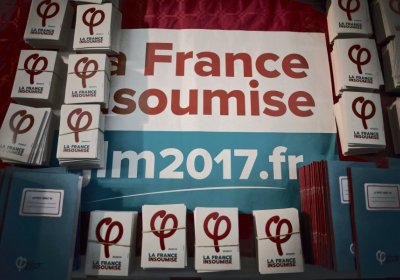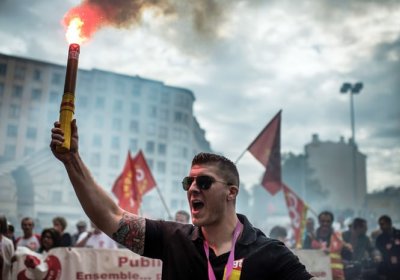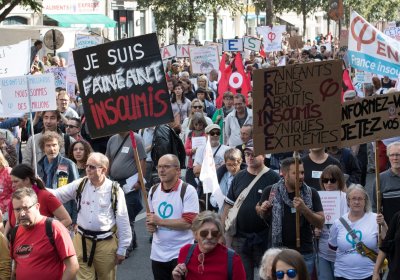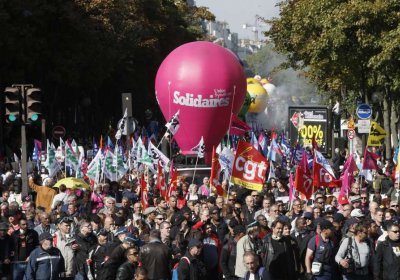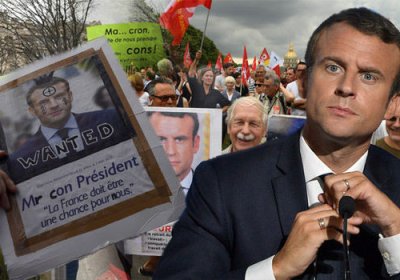Thousands of people flooded the streets of France to demonstrate against President Emmanuel Macron’s economic reforms on May 27. "In the name of the poor, the humiliated, the homeless and the jobless, we are telling you, 'Enough, enough of this world'," leader of the left-wing France Unbowed party, Jean-Luc Melenchon, said.
Emmanuel Macron
Strikes, protests and occupations are breaking out everywhere. Sam Wainwright writes that resistance to French president Emmanuel Macron’s austerity plans is gathering pace and its development will determine the future of the country.
Macron and his big business patrons complain that France has failed to “modernise” like Britain did during Margaret Thatcher’s reign. A key turning point that explains why the French working class has been able to slow this process was the huge social movement and strike wave of 1995, in which millions of people took to the streets.
France is once again on the brink of an all-out industrial war — and its outcome could transform the country’s political landscape.
More than 1600 delegates gathered for the third annual conference of La France Insoumise, the radical left political project that has stormed onto the stage of French politics, over November 25-26 in the city of Clermont-Ferrand.
The group’s name defies a neat translation, often rendered as France Unbowed, Unsubmissive or Untamed. Only launched in February last year, the group is widely seen as the only real and effective opposition to President Emmanuel Macron. Founding spokesperson and former presidential candidate Jean-Luc Melenchon is recognised in opinion polls as the effective leader of the opposition.
One of France's largest union confederations, the General Confederation of Workers (CGT), held a strike on October 19 as part of the campaign against the anti-worker and anti-union ordinances adopted by the Emmanuel Macron government.
The mobilisations were far smaller than the previous three days of protests and have further fuelled discussion within the movement over how to overcome divisions and weaknesses and mobilise the widespread latent public opposition to the government's attacks.
Hundreds of thousands of workers, retirees and students joined a third day of strikes and protests across France on October 10. The protests are part of ongoing efforts by unions, left parties and progressive organisations to defeat attacks on workers and the public service by President Emmanuel Macron.
Protests were held in 140 cities and towns and drew 400,000 people into the streets.
At the centre of the day was a strike called by the nine union confederations active in France's public sector.
France’s Council of Ministers approved five ordinances on September 22 that undermine union power and employment rights within France’s Labour Code, which came into effect the next day.
The government imposed these changes by using undemocratic measures in France’s constitution, which allows it to push new measures into law without passing legislation through parliament.
In the face of this, the movement against the changes continues to build.
About 250,000 people joined 400 protests in cities and towns across France on September 21, the General Confederation of Workers (CGT) said, in the second round of mass protests against President Emmanuel Macron’s anti-worker laws.
This was about half the number of people who mobilised for the first round of protests and strikes on September 12. The protests came the day before a meeting of the Council of Ministers to ratify five ordinances, which will undermine the rights of workers and their unions.
France’s militant unions held the first major day of protest on September 12 against the ordinances introduced by the government to undermine the country’s labour laws.
Their protests were seen as the start of the campaign to defend workers’ rights. It served as a major test for the capacity of the movement to mobilise working people while France’s unions are divided as to how to respond to the attacks.
Residents of the Caribbean islands of Saint Martin, Saint Barthelemy and the British Virgin Islands have been left with little support to face the humanitarian crisis caused by Hurricane Irma.
According to the latest count, nine people died on the French administered side of Saint Martin and hundreds more were injured after Irma hit on September 5. About 1 million people have had no water or electricity since the hurricane hit with winds of 250 kilometres an hour, destroying around 95% of the French side of Saint Martin.
Hurricane Irma has just passed through the Caribbean, in a procession of tragedies that have destroyed lives and left material damage behind.
In response to this natural disaster, Venezuelan President Nicolas Maduro sent humanitarian aid to Cuba, Antigua and Barbuda (with 95% of buildings in Barbuda destroyed), and the French colony of Saint Martin on September 10.
Trade unions protested in Paris on August 31 as President Emmanuel Macron unveiled his new attacks on workers’ rights. Macron’s proposed labour “reforms” would make it easier for bosses to hire and fire workers.
Macron wants parliament to vote on the new legislation — the third attack on workers’ rights in the past few years — without a chance to amend it.
- Previous page
- Page 2
- Next page



